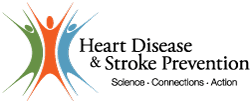About Us
On this Page

Our Vision
To create a heart-healthy and stroke-free world.
Our Values
- Accountability
- Collaboration
- Communication
- Integrity
- Leadership
- Respect
- Service
Our Work
CDC's Division for Heart Disease and Stroke Prevention works to improve cardiovascular health through public health strategies and policies that promote
- Healthy lifestyles and behaviors.
- Healthy environments and communities.
- Access to early and affordable detection and treatment.
With $110 million for heart disease and stroke prevention in Fiscal Year 2014, CDC supports all 50 states and the District of Columbia to conduct heart disease and stroke prevention efforts.
Top of PageFunded Programs
- State Public Health Actions to Prevent and Control Diabetes, Heart Disease, Obesity and Associated Risk Factors and Promote School Health
The State Public Health Actions to Prevent and Control Diabetes, Heart Disease, Obesity and Associated Risk Factors and Promote School Health (State Public Health Actions) grant is a multifaceted initiative to improve health for all Americans through coordinated chronic disease prevention programs. The State Public Health Actions grant funds statewide initiatives to prevent, manage, and reduce the risk factors associated with chronic diseases—including childhood and adult obesity, diabetes, heart disease, and stroke. - Paul Coverdell National Acute Stroke Program
CDC funds state health departments to set up surveillance systems that measure, track, and provide data to improve the delivery and quality of stroke care among acute stroke patients. The goal of the Coverdell Program is to ensure that all Americans receive the highest quality of acute stroke care available to reduce untimely deaths, prevent disability, and avoid recurrent strokes. - WISEWOMAN
CDC funds states and tribal organizations to offer WISEWOMAN programs in local clinics and public health departments. WISEWOMAN is a prevention program that provides risk factor screenings, lifestyle interventions, and referrals to uninsured and underinsured, 40- to 64-year-old women, to help reduce their risk for heart disease, stroke, and other chronic diseases. Through tailored programs, WISEWOMAN provides women with education, skills, and resources to quit smoking and improve their diet, physical activity, and other lifestyle behaviors. - Sodium Reduction in Communities Program (SRCP)
In 2013, CDC awarded funds to support two state coordinated programs and five large municipalities to decrease sodium consumption in the population. In 2014, CDC expanded the program and awarded three additional grantees: two state coordinated programs and one large municipality. The program aims to increase access to and accessibility of lower sodium food options, to reduce sodium intake, and to continue to build practice-based evidence around effective population-based strategies to reduce sodium consumption at the community level.
Core Functions
Programs
To prevent heart disease and stroke, and eliminate health disparities, CDC provides to state health departments, tribes, and other partners
- Funding
- Technical support
- Resources
Research
- CDC engages in applied research to support evidence-based practice.
- Through our research, science translation, and resource development, CDC helps state and national health agencies implement public health strategies to address the burden of heart disease and stroke.
Surveillance
- CDC tracks trends in cardiovascular risk factors and diseases, and documents differences in their distribution by age, gender, race/ethnicity, socioeconomic status, and geographic location.
- CDC shares these findings with our many partners and collaborates in applying public health strategies to improve cardiovascular health.
Evaluation
- CDC evaluates programs, policies, and interventions to ensure they are working as planned and producing the intended results.
Partnerships
- CDC partnerships with government agencies, states, and public and private organizations allow us to maximize collective resources.
Resource Management
- CDC promotes integrity and accountability in all administrative transactions.
- CDC works to ensure recruitment, retention, and training policies sustain a highly skilled and diverse workforce.
- Page last reviewed: February 10, 2015
- Page last updated: February 10, 2015
- Content source:



 ShareCompartir
ShareCompartir